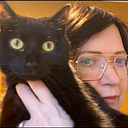When Life Gives You “Great Material”
"Why aren’t you living in a trailer park?” a writer asked me once.
I was (and am) a fan of this writer’s books, and I had just met them at a small gathering in Manhattan. We were talking about the writer’s work and some other things, and over the course of the conversation they mentioned a tongues-speaking evangelical church they’d ventured into not long before. I said my mother had once started that very kind of church in my living room. And then the writer, as we used to say, laid that on me. “I can’t compete with that,” they said. Next came the trailer park question.
I was so flummoxed, I don’t remember how I answered. The layers of assumption and caricature I felt I detected made it impossible, in the moment, for me to figure out how to respond with grace. I didn’t want to ruin the gathering by angrily defending people in trailer parks, or by angrily defending myself, or by angrily saying anything at all. I can’t say I’ve always been so wise. Probably I sipped my drink and said something true, a little bit pointed, and a little bit evasive.
I don’t mean to single this writer out. Theirs was the bluntest form of that question anyone has asked me, but the dots were being connected in a way that has become familiar. In my case, the assumptions were wrong. All the complexities of my upbringing notwithstanding, I did not grow up in poverty. In some ways, as the daughter of a lawyer, I was highly privileged; it’s also true that I lived at points in houses infested with rats, but not for the reasons that circumstance often suggests to people.
It puzzles me when people congratulate a writer, or any artist, on having “such great material” from a difficult past. I don’t recall this happening before I moved to New York, but it probably did. It’s such a strange way of looking at things, to me, that various strangers must have said it many times before it finally struck me as a common point of view. But the thing about a bonkers childhood and any resulting trauma is that it doesn’t all just leap out of your brain and heart and onto the page, or at least it didn’t in my case. I had to feel my way through it first, learn to work with my history without injuring myself.
On the other hand, like many writers, I do have a kind of strange nostalgia for some of the parts of my life that were difficult. Those experiences helped give me the perspective I have, and I’m grateful for that perspective. Oftentimes I enjoy my essential weirdness. And I guess from that way of looking at things, it all really is great material, after all.
